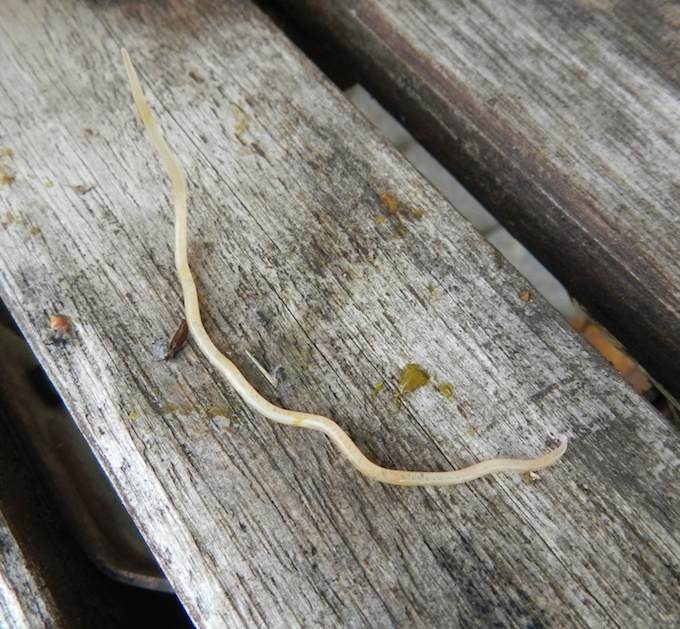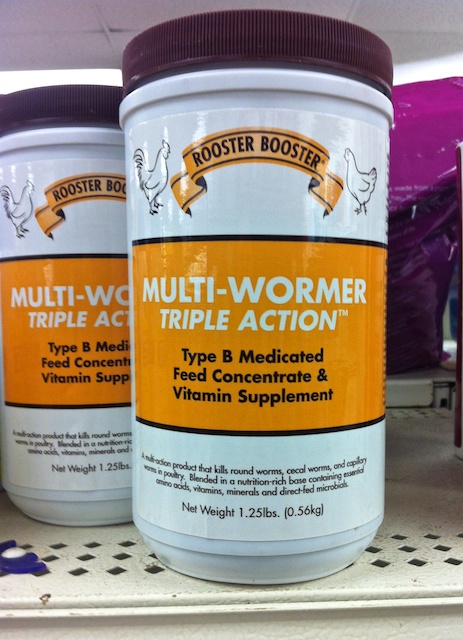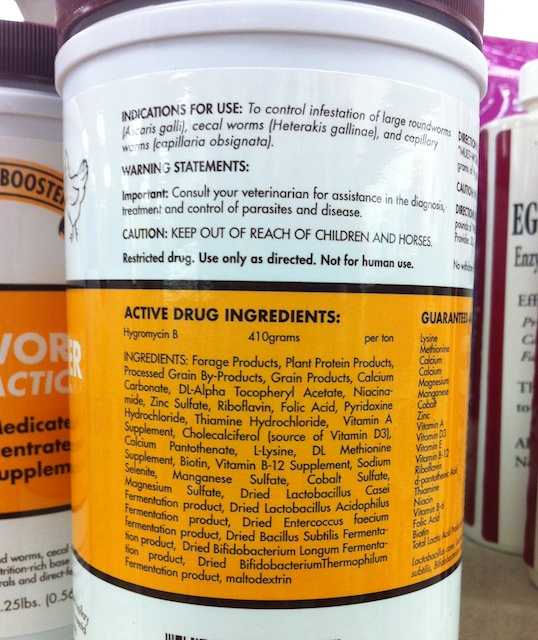I post a mix of storytelling, daily observations, and chicken care advice here at HenCam. I haven’t written any serious animal health blogs recently, not because I’m not doing them anymore, but rather because I’ve been delving deeply into some issues. (As an aside, I want to thank everyone who contributes to what I do here at HenCam. When you purchase one of my books, or “buy me a cup of coffee” you enable me to take the time to think, research and write. I’m very grateful to you!)
Today’s post is important.
All animals have internal and external parasites. They look nasty and gross us out, but it’s a fact of life. Good animal husbandry accepts that they’ll be there, understands the life cycle of these pests, and manages housing and environment to minimize the load. We keep an eye on things. We make adjustments for weather, and the health and age of our animals. When parasites negatively affect our animals (lack of thrift, decrease in production, discomfort), we do something. In twenty years of chicken keeping, I’ve done a lot, but I’ve never administered drugs.
Guessing what is wrong with one’s flock is rampant, and on-line forums fuel the worry. As soon as someone sees runny manure, someone else yells, worms! Before jumping to conclusions and administering chemicals (some of which are legal for broilers but not laying hens), first make sure that these parasites are actually living in your birds. Take a fecal sample to your vet. Only once, in all of my years of chicken keeping, has the fecal sample tested positive, and that was for a low load of tapeworms. I adjusted my manure management, and my hens haven’t tested positive again.
I’ve done eighteen necropsies and I’ve only seen worms once, in elderly Eleanor. I found round worms in her intestine. There were only two. They had nothing to do with why she died.
Chickens that are healthy and are in a clean and dry environment, and eat a varied diet, rarely have parasite problems. Gail Damerow, in her book Raising Chickens, states that “under proper management, including good sanitation, chickens gradually develop resistance to parasitic worms.” She doesn’t cite a reference for that claim, but I do agree with her. It’s important to know that most parasites reproduce outside of the chicken – often in other bugs, and always in damp and dark surroundings. So, sunshine, manure management, cleanliness, and control of animals like beetles and cockroaches, can take care of almost all internal pest issues.
Still, there are times when there truly is a parasite infestation. Treatment is difficult. I know of no chemicals on the market approved for laying hens. That’s why I was surprised when I recently noticed a new product at my local feed store, Rooster Booster.
I was intrigued because the label claimed that it was legal for laying hens. The label also emphasized the “nutrient-rich” base. Was this a new herbal powder or supplement? I asked the store manager. He didn’t know.
I did some research. Hygromycin B is an antibiotic. This is not stated on the label. I guess we’re supposed to know. Or, perhaps the manufacturer hopes that we don’t? Many of us raise chickens to have a source of eggs not tainted by drugs. Since this is being sold at feed stores to backyard hen keepers, and is packaged as if it is a natural supplement (after all, it has vitamins and probiotics in the ingredients), I am outraged.
Hygromycin B was approved by the USDA in the 1980s, but, for business reasons, has been off the market for years. Well, it’s back on. A chemical trading website states: Hygromycin B , very safe de-worming drug, can effectively kill the roundworm of pigs, whipworm and chickens’ roundworm, and have antibacterial effect. And it also can be used for chicken feed. However, it goes on to report: The Hygromycin B is very toxic by inhalation, in contact with skin and if swallowed. It may cause sensitization by inhalation and skin contact. It has risk of serious damage to the eyes and limited evidence of a carcinogenic effect. Before use (sic) it, wear suitable protective clothing, gloves and eye/face protection. Do not breathe vapour and dust. Interesting how “very safe” and “very toxic” are in the same paragraph, and this from a website that is pro-chemical. There’s more, which you can read on this link.
Hygromycin B is a product that commercial growers use on an ongoing basis not only to control parasites, but also to increase productivity and reduce food costs. They feed antibiotics because without those drugs, their chickens would be sickly or die. They put it in their flock’s rations so that they can provide the cheapest of feedstuffs and still get a high volume of eggs. Those reasons don’t apply to my flock, and shouldn’t apply to yours. Let’s keep antibiotics off of our own properties and out of our own personal food stream.
Please share. Thank you.




I can not thank-you enough for doing all the research then letting us know in perfectly understandable language what the score is! There is so much to learn about chicken-keeping and you sure help us newbies feel more confident about caring for the flock in a responsible way. Thank-you Terry. :)
That’s odd that this is being sold over the counter if it’s an antibiotic… aren’t antibiotics only available with a prescription? And don’t antibiotics only kill bacteria, not worms? It all just adds to the mystery surrounding this product. Not to mention sweepingly general ingredients like “forage products” and the warning “Keep out of reach of children and horses” (horses?…).
Thank you for this information and for reminding us all to be vigilant!
Human antibiotics require a prescription. Many for animal use do not. Industrial, commercial growers routinely feed antibiotics throughout the life of the animal, not to combat specific disease outbreaks, but to promote growth and reduce costs. The vast majority of antibiotic manufacture in the world goes into animal feed. There is growing concern about this being the main reason for the emergence of antibiotic resistant superbugs. Also, there’s research that shows that the animals that live with an animal on antibiotics is affected by the drug.
Ah, yes, I was remembering a story about a new FDA rule that food producers must get a vet’s prescription in order to use antibiotics for animal illness–and outright banning the use of antibiotics for growth (http://www.nytimes.com/2013/12/12/health/fda-to-phase-out-use-of-some-antibiotics-in-animals-raised-for-meat.html?pagewanted=all&_r=0). I didn’t realize the rule hadn’t been implemented yet. Apparently it’ll be rolled out over the next 3 years, but obviously it hasn’t yet affected the likes of Rooster Booster.
Loopholes galore in that rule. I don’t expect to see any real changes.
Thank you Terry for what are always well researched blogs. I hope that many who benefit from your blogs in order to better meet the health needs of their flocks and to enjoy these wonderful birds to the fullest potential are also supporting you financially when they are able. Let’s all treat Terry to a latte!
Very good article and I strongly agree, Terry! Any use of medication in our flocks should be done only when and where needed, carefully and judiciously applied.
I use ivermectin (brand name noromectin) as a dewormer. There is a 2 week withdrawl period where you shouldn’t eat the eggs. Gapeworm is really common in my area, my neighbor’s chicken got it. My cat vet (who also used to see chickens) said that worms are the most common problem she saw with chickens. The reason commercial birds are not but on dewormer is because they are killed before they get old enough for the problem to develop :(
I don’t want to eat antibiotics in my food, but I really think this is an animal welfare issue. I give my cats and dogs ivermectin for heartworms. My chickens are just as much part of my family. Plus the chickens only need to be dosed twice a year, one of which can be done in the winter when they are already off their laying. So that makes 2 weeks of downtime a year.
Ivermectin is not an antibiotic. Big difference. Even so, I would be wary of regularly giving the same chemical to combat worms. The parasites do develop a resistance. I maintain my stance that you should do a fecal before treating, and if there is a problem, adjust your management, bedding, etc. Heartworm medication for a dog is a different story, as by the time you know the worms are there, they’ve caused permanent damage, if not fatality.
I occasionally give my birds an olive oil and garlic mixed with scratch and pellets,which is an organic or natural worm remover..
That can’t hurt, and it might help, anything to keep your hens at the peak of health helps them to ward of disease and parasites. However, olive oil and garlic doesn’t actually kill the parasites if your flock is infested. That’s true with a lot of natural and herbal “remedies”. There’s a lot of claims and anecdotes, but little research bears it out. There is some research that shows that pumpkin seeds are an anthelmintic. But, you’ve got to feed a lot and they have to be ground up. Still – it doesn’t hurt to offer your chickens pumpkins to eat in season. In the end, I believe that you keep them healthy (and use garlic if you want) but if your hens are showing signs of illness, use proven medications.
Thank you for confirming my own thoughts about worming in general and this product in particular. I’ve never been a big fan of worming any animal twice a year “just because” ( I’ve only had a dog or cat test positive for worms once in 45 years) but as a newer chicken keeper I was worried that maybe chickens were different since they eat pretty much anything they can scratch up and are always digging around on the ground. Our 4 chickens have an airy very clean coop and run. They seem very healthy and content and I think you’ve helped me keep them that way. Enjoy the cup of coffee I sent you while I happily ignore the worming advice from You Tube.
Thank you for the coffee! Glad that I could confirm your already good animal husbandry.
thanks again for the research
enjoyed giving your cookbook to friends now need to order 3 more.
.
Thanks!!!
Good find! Thank you for the warning. It’s sad that consumer’s can’t let their guard down for one minute, but that’s the way it goes.
(My favorite: herbal laxative Senna is an ingredient in most “weight-loss” teas, with no mention of its laxative effect and no warnings about long-term use!)
It is rational that antibiotics in feed will increase the stock animal’s growth rate, since it would eliminate some digestive tract bacteria, leaving more digestible energy for the animal to use. With the increase in antibiotic-resistant bacteria, this practice needs to be reexamined!
But I wonder if the bacteria living in the digestive tract don’t help prevent parasites? In diseases such as Clostridium dificile infection, the cause is often disruption of the normal digestive tract bacteria by antibiotics, allowing the harmful Clostridium bacteria to “move in”. I think of digestive flora as tiny, territorial gangsters!
Also it would be interesting to know if free-range foraging hens ever “self-medicate” by consuming bitter herbs or other substances (I’d read that gorillas “self-medicate” by eating herbs they normally find unpalatable when they feel unwell.)
BTW- I’d read that crickets and earthworms may contain parasites…?
Oh yeah, the first ingredient in this product: “Forage products”!? Sounds like that could be pretty much anything! (LOL!)
Rather like “animal by-products” but in plant form. Thanks for pointing that out.
Chickens living in industrial agriculture situations are so stressed that good gut bacteria is the least of their worries, but flocks in our own backyards do benefit from those beneficials. Yes, earthworms and crickets, and especially the dark wing beetles are intermediary hosts of the eggs of parasites. Keeping your coop dry and sun-filled keeps them, and the risk, to a minimum.
I think stressed is a nice way of putting it. I view it as criminal and as you know Terry I am not a PETA flag waiver.
Battery cages, farrowing crates and veal “sheds” just to name three are inhumane in my very humble opinion.
I noticed that the vitamin E is synthetic. That always raises a red flag for me.
Thanks for “talking” about this product.
Good point!
Again, thanks Terry for such an informative post. I personally have not used any chemical wormer treatment for my chickens. I have however used a product that claims to be completely natural as an internal cleanser. It is supposed to help stop the infestation of worms (not kill worms if they already have them). I only use this sparingly every few months. It is called Chicken Wormwood and made by Farm & Yard Remedies. It says that it is a natural herbal combination, no chemicals therefore no need to lay off using any eggs. It is so easy to use, just put some drops on a piece of bread (for 3 days). It smells really lovely too (like a proper old fashioned recipe). I wonder if you have something similar in the US or if anyone else has used this product? Regards, Louise.I
We don’t have that product here, but we have all sorts of “herbal wormers” and such advice. I doubt they do any harm, and perhaps they help. However, until I see studies of flocks infested with worms, and then the problem resolved with such product, I wouldn’t call them a “wormer.” They might increase the flock’s ability to fight off parasite infestations. Again, without studies, who knows? I haven’t used any such products and have not had a problem for 20 years. So, there’s anecdotes for all sides of the story.
We like to put Cayenne pepper in our hens and roosters’ feed to help against worms It seems to help them. They don’t mind cayenne either.
This is the sort of anecdotal story that I wish was verified by a study. There’s no proven cause and effect. I might say that “I put coffee grounds in for the chickens (coffee grounds are put into their compost) and it helps them.” My chickens are very healthy. Nice theory, but not based on anything. There are currently a number of herbal “remedies” and coop bedding enhancements on the market. They smell nice, but beyond that I doubt they do 99% of what they claim. Still, maybe cayenne does boost your flock’s immune system. It’s possible!